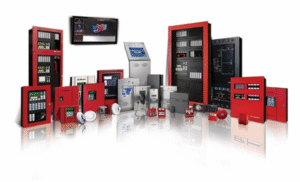Fire can be sudden, frightening, and destructive. The idea of a fire starting at home or at work is enough to make anyone take notice. That’s why a fire detection system matters so much. You and your loved ones, or your team at work, have the best chance of staying safe because it can detect heat or smoke early.
In this blog, we’ll walk you through how a fire detection and fire alarm system help keep us safe, what its components are, and why installing one promptly can make a significant difference.
What Is a Fire Detection System?
A fire detection system is simply a group of devices that monitor for signs of fire—such as smoke or rising heat—and then alert everyone that something might be wrong. When something’s off, the system triggers an alarm. That’s the fire alarm system doing its job.
In many places, a fire detection alarm and a fire alarm system are tied together. First comes the detection (the part that senses fire), and then the alarm lets everyone know.
How Fire Detection Systems Work?
Here’s a plain look at how these systems do their job:
1. They sense early signs of fire – This could be a bit of smoke or a noticeable heat change.
2. They alert using sound or lights – The fire alarm system panel sends the alert through sounds, flashing lights, or both.
3. People respond quickly – With the alarm, people can escape, call for help, or use an extinguisher if it’s safe.
The fire detection control panel is the central component. Think of it as the “brain” that brings everything together—it hears the signals from detectors, then makes the alarm happen.
Important Components of a Fire Alarm and Detection System
1. Smoke and Heat Detectors
These devices sit quietly on the ceiling or wall, watching for undesirable smoke or hot air. They’re what start the chain of events.
2. Fire Alarm System Panel
This is the small box (sometimes on a wall) that links everything. It gets the signal from the detectors and sends the alert out.
3. Alarm Sounders and Signals
Once the panel gets a warning, it sets off horns, bells, or flashing lights around the room to wake everyone up and let them know to move.
4. Backup Power Supply
If electricity fails—maybe because of the fire or a power cut—the system still needs to work. So, it includes a battery or backup power, so nothing stops working when it matters most.
Types of Fire Alarm Systems
Home Fire Alarm System
Made for everyday houses, apartments, or small buildings. These systems often have a few smoke detectors and a small panel—simple, effective, and quiet until needed.
Commercial Fire Alarm Systems Installation
Offices, stores, schools, or factories usually need bigger setups. More detectors, more alarm points, and stronger panels. The commercial fire alarm systems installation is done following special rules to keep everyone safe—both the people inside and any visitors.
Wired vs. Wireless
(i) Wired systems have detectors connected with cables to the panel.
(ii) Wireless systems use radio signals instead of wires.
Wireless can be easier to install in tricky spaces; wired can be tough to set up but is often seen as more reliable.
Why Fire Alarm System Installation Matters
Putting one of these systems in place the right way really matters. When done well:
(i) Every part works as it should.
(ii) Alarms sound clearly where needed.
(iii) The system keeps working even during power problems.
Skipping over good fire alarm system installation can lead to missed alerts, slow responses, or worse—alarms that don’t go off when fire strikes.
Regular Checks and Care
Installing a system is only the beginning. Now, you need to make sure it works when needed.
(i) Test your home fire alarm system every month. Press the “test” button and listen for loud, short tones.
(ii) For a commercial fire alarm system, a trained person should check more often—maybe every few months—as part of maintenance.
(iii) Replace old detectors after a certain time (often 10 years). Batteries need changing too—even if your system has backup power, the batteries wear out eventually.
Good care means peace of mind. You’ll know the system will work, day or night.
Why Fire Detection Systems Matter
Here’s why putting in a fire detection and alarm system is so important:
1. Early warning saves lives- Smoke or heat doesn’t always allow you time to react, so you need quick alerts to get out in time.
2. They protect homes and property– The quicker firefighters know, the better they can stop damage.
3. They offer peace of mind– Whether you live in a house or run a business, knowing you have an active system gives comfort.
4. They meet rules and regulations– Especially for businesses or rented places, fire codes often require them.
5. They help everyone stay calm- When alarms work as they should, people know what to do—exit calmly, call help, stay safe.
Conclusion
Fire detection systems are simple in purpose but priceless in the protection they offer. From a humble home fire alarm system to a full commercial fire alarm system installation, having one increases your safety, peace of mind, and readiness.
With smoke or detectors watching faithfully, a clear fire alarm system panel, and regular care, such systems can give everyone the precious seconds they need in an emergency. Don’t delay, whether it’s for your family or your business. Installing a good fire detection and fire alarm system is one of the smartest steps you can take.
FAQ
1. What is the difference between a smoke detector and a fire alarm system?
A smoke alarm is a single device that senses smoke and makes a noise. A fire alarm system includes many parts—detectors, alarm sounders, and a control panel. Together, they alert your whole home or building.
2. Do I need a professional for fire alarm system installation?
Yes—especially for a commercial fire alarm system. Pros make sure everything’s placed correctly and connected the right way. Even for a home system, a pro can save mistakes and make sure the system works when you need it.
3. How often should I test my home fire alarm system?
Test it monthly. Push the “test” button on each smoke detector and listen for the sound. Batteries or backup power should also be checked regularly.
4. What if the power goes out—will the system still work?
Yes. A proper fire alarm system includes a backup power supply (like a battery) so it keeps working even if the lights go out.
5. Can I install a wireless fire detection system at home?
Absolutely! Wireless systems are easier to install because there’s no need for wiring. They work by sending signals by radio. Just make sure they’re installed properly and tested.


